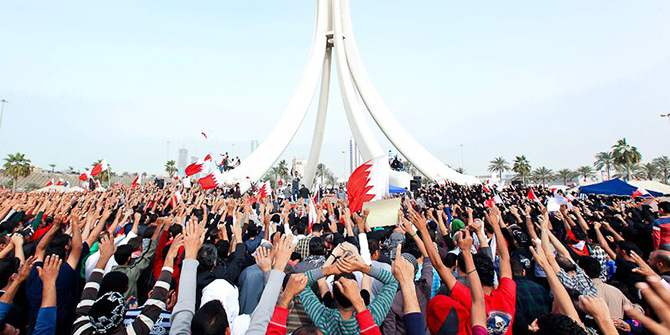From unpalatable to more unpalatable, the West weighs its options as violence continues in Syria. Dr Christopher Phillips, lecturer in the International Relations of the Middle East at Queen Mary, University of London, explores. What the west can do will also be up for discussion and debate on Wednesday, 30 May, 6:30 pm at Queen Mary with a panel including Ian Black, Ausama Monajed and Ammar Wakkaf.
By Christopher Phillips
After more than a year of protest and violence, and over 10,000 deaths, the Syrian crisis looks no nearer to an end. Unlike in Egypt and Tunisia, the ruling regime of President Bashar al-Assad appears entrenched while the opposition has shown itself to be determined, if militarily weak, in the face of near-constant repression. With neither side seemingly close to either victory or defeat, Syria remains in an ever-more violent deadlock, with the spectre of an Iraq-style civil war along confessional lines a real possibility. Already there has been a burst of suicide bombings, formerly unheard of in Syria, allegedly by anti-regime radical jihadists, operating without the blessing of the main opposition groups.
All options open to the West to try to curtail the violence appear unpalatable. If nothing is done, Assad is likely to continue the slaughter of his own people while, at the same time, continued violence and rising criminal activity slowly erodes the authority of his state, encouraging the conditions for prolonged conflict. Yet any kind of intervention carries with it a host of problems. No international consensus exists for a western-led military operation, and even if there was, the West would be reluctant. The Syrian rebels are far weaker and the regime is far stronger than their Libyan counterparts were prior to NATO intervention there in 2011. This imbalance has further deterred western states from arming the rebel Free Syria Army (FSA) until now, aware that it might take years for them to reach parity with Assad’s well-stocked forces. Western leaders are conscious that any such intervention may only exacerbate Syria’s descent into chaos, especially given the uncertainty over how united and coherent a force the FSA really are.
Even more unpalatable would be to consider a future Syria with Assad still in charge, effectively abandoning the diplomatic support given to the opposition and rolling back from earlier calls for the president to go. Not only would western leaders lose face internationally, but this volte face would also leave Assad, and dictators elsewhere, believing that force works. While it might halt the violence in the medium term by allowing an Assad victory, in the long term it would leave Syria suffering under a brutal regime.
It is perhaps not surprising then that western responses to the Syrian crisis have struggled to tread a line between ethics and realism. Outrage has been expressed at the regime’s brutality and Barack Obama has led calls for Assad to step down, while also indicating that a NATO strike is not on the table. Sanctions from the EU and US have targeted specific individuals within the regime, along with boycotting the purchase of Syrian oil and banning transactions with Syria’s state-owned banks. The exiled opposition umbrella group, the slightly hapless Syrian National Council (SNC), has been supported, though not recognised as a government in exile, while pressure has been placed on Syria’s allies at the UN Security Council, Russia and China, to halt their support of Assad, to little avail. While the West did back a short-lived ceasefire brokered by former UN Secretary General Kofi Annan, few seem to believe that the regime is willing to seriously negotiate.
The danger, however, is that by tinkering at the edges rather than either helping to push Assad out of power, or pursuing a realpolitik that permits Assad to remain, western actions could make matters worse. Might the sanctions contribute to the slow erosion of Syria’s economy, force the liquidation and migration of its middle class and cause severe damage to Syrian society? When Assad does eventually fall – perhaps in a few years – might Syria be like Iraq was after a decade of sanctions and fall into sectarian conflict? By backing an opposition that seemingly can’t win over a sizeable segment of the Syrian people to prove decisive and, at the same time, being unwilling to intervene decisively to tip the balance in its allies favour, is the West prolonging a conflict that the regime would naturally have won by now? As this conflict continues, might more radical groups take advantage of the growing power vacuum and emerge to destabilise not only Syria, but also its neighbours: Israel, Lebanon, Iraq, Jordan and Turkey?
Paradoxically, Syria’s position at the heart of the Middle East, neighbouring so many potentially unstable states, makes western leaders far more cautious than they were in isolated Libya. Western leaders are rightly cautious about storming into another Arab country where they might do more harm than good. Yet that doesn’t mean that the current western position is the correct one. Tinkering at the edges by backing an ineffectual opposition and risking damage to the country in the long run through badly thought-through sanctions could be as damaging in the long run as either a misguided military intervention or negotiating with Assad’s brutal regime. No option is without risks and none look particularly appealing, meaning the Syrian crisis will continue to give western policy makers a headache for quite some time yet.
 Christopher Phillips is Lecturer in the International Relations of the Middle East at Queen Mary, University of London. He has lived in Syria for several years and was formerly Syria and Jordan specialist for the Economist Intelligence Unit. His first book, Everyday Arab Identity, is available from Routledge from September 2012.
Christopher Phillips is Lecturer in the International Relations of the Middle East at Queen Mary, University of London. He has lived in Syria for several years and was formerly Syria and Jordan specialist for the Economist Intelligence Unit. His first book, Everyday Arab Identity, is available from Routledge from September 2012.





